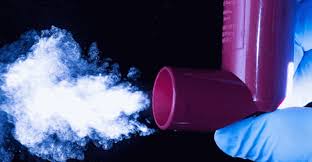بِسۡمِ اللهِ الرَّحۡمٰنِ الرَّحِيۡمِ
Numerous devices are utilized by patients suffering from respiratory ailments such as asthma, COPD, emphysema, bronchitis, bronchiectasis, cystic fibrosis, among others, to administer medication to the lungs via inhalation. The regulations outlined below pertain to various types of inhalers (including aerosol inhalers, metered dose inhalers, dry powder inhalers) and spacers, but exclude nebulizers.
In this context, Islamic jurists (fuqaha) have articulated two rulings, as delineated below.
The General Principle of Invalidating a Fast:
If a substance with consequential effects reaches a consequential cavity and remains therein independently through a consequential orifice, without excuse (e.g., forgetfulness), the fast is invalidated. All five aforementioned criteria must be met for the fast to be deemed invalid according to the Ḥanafiyyah school, which confines the definition of consequential cavity to the throat, stomach and intestines. Furthermore, the consequential orifice must be connected to the consequential cavity either directly through a passage (manfadh) or indirectly via another cavity.

Jurisprudential Issues Related to the Use of Inhalers:
Contemporary Muslim jurists consider three classical examples when deriving their rulings in this matter:
1. Inhaling water vapour from food or smoke from incense:
According to the Ḥanafiyyah, Mālikiyyah, and Ḥanābilah schools, intentionally inhaling water vapour or smoke constitutes a breach of the fast. Conversely, the Shāfi'iyyah school holds that ingestion of water vapour or smoke does not invalidate the fast.
2. Ingestion of medication orally:
All four Sunni madhāhib concur that intentional ingestion of medication breaks the fast.
3. Gargling during ablution (wudu) and swallowing residual water while fasting:
All four Sunni madhāhib agree that swallowing residual water after gargling falls under the category of overlooked actions.
Ruling 1: Inhalers Invalidate the Fast: See youtube video by Mufti Abdur-Rahman ibn Yusuf
Jurists who maintain that using an inhaler invalidates the fast apply the fiqhi principle that intentional inhalation (drawing a substance into oneself) of a substance with a perceptible body, such as smoke, water vapour, aerosol, or similar, nullifies the fast because an invalidating substance reaches an invalidating cavity via an invalidating orifice (i.e., mouth and nose). This ruling aligns with the perspective of Ḥanafī jurists, who assert that since a fasting person resorts to an inhaler only when necessary, potentially saving a life, no expiation (kaffāra) is required; rather, the individual must make up for the missed fast (qaḍā').
Ruling 2: Inhalers Do Not Invalidate the Fast: See Fatwa of Shaykh Muhammad bin Saalih al-Uthaymeen in Fatawa Arkaanul-Islam: Vol 021 p.658
Those who argue that using an inhaler does not break the fast present several points:
Point 1: Using an inhaler is not akin to eating or drinking.
Counter argument: The critical aspect is not whether the inhaler constitutes eating or drinking, but whether any substance has been intentionally ingested into the stomach.
Reply: Not all substances entering the stomach nullify the fast; for example, residual water in the mouth after rinsing is overlooked.
Point 2: Jurists unanimously agree that a fasting person may rinse their mouth and nose, leaving traces of water in the mouth that eventually reach the throat, a passage to the stomach. Similarly, minute amounts of medication may reach the throat and possibly the stomach via inhaler use, yet due to their insignificance, they are overlooked, akin to residual water after mouth rinsing.
Counter argument: This analogy is flawed; while gargling targets the mouth, inhaler use targets beyond the mouth, reaching the throat, a passage to the stomach.
Reply: The inhaler's intended destination is not the stomach but the lungs; thus, what invalidates the fast is substance reaching the stomach. Additionally, the residual water from gargling is unavoidable, unlike inhaler use.
Point 3: All jurists concur that using a dry miswāk (teeth-cleaning twig) during fasting until midday does not invalidate the fast. Ḥanafī jurists permit its use throughout the day, even if wet. Despite containing various chemicals, it is likely that trace amounts of these chemicals reach the throat and the stomach, yet they are disregarded; likewise, the minute medication amounts reaching the throat and stomach via inhaler use.
Point 4: Inhaler particles may reach the throat, but there is uncertainty regarding their arrival in the stomach to nullify the fast. The legal maxim affirming certainty despite doubt is invoked. Therefore, a fasting individual remains in that state until evidence suggests otherwise.
Counter argument: Studies indicate that only about 10% of medication reaches the lungs (40% optimally), indicating that some medication must reach the stomach, especially with aerosol inhaler use alone.
Reply: The amount reaching the stomach is comparable to water after gargling and can be overlooked. Typical Salbutamol inhaler doses are minimal (200-400 micrograms), and with dry-powder inhalers, the stomach-bound medication is extremely scant.
Ruling 2, asserting that inhaler use does not invalidate the fast, is supported by numerous jurists, including Sheikh `Abdul-`Aziz bin Abdullah ibn Baz, Sheikh Abu 'AbdAllah Muhammad ibn Saalih Al `Uthaymeen, and Sheikh `Abdullah ibn Jibrin, as well as the Saudi Permanent Committee for Fatāwa. At the 9th Fiqh-medical seminar in 1997, the majority of scholars agreed that inhalers do not break the fast.
Dr. A. Hussain
